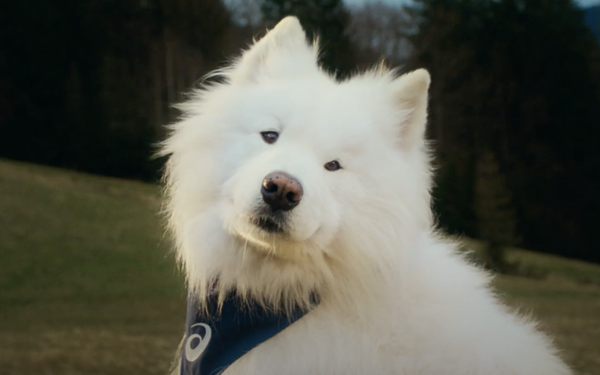
Asics has found a
new brand ambassador—and he’s got four legs, a plush coat, and a penchant for Zoomies. The Japanese sportswear company just announced it’s partnering with Felix the Samoyed to front
a new mental wellness campaign rooted in a global research study.
It’s a fluffy move, for sure. But for Gary Raucher,
ASICS’ executive vice president of global marketing, it’s a sharply on-brand extension of the company’s 75-year-old mission to get people moving to benefit both body and mind.
With sales climbing nearly 20% in the first quarter and especially strong growth in its lifestyle and performance categories, the company’s “Mind’s Best Friend” effort comes
at a moment when many brands are scrambling to define what wellness looks like. Raucher explains why this pup-led push may be just what consumers—and the ASICS brand—need right now.
advertisement
advertisement
Interview has been edited for length and clarity.
Marketing Daily: Where did this idea come from? Why Felix?
Gary Raucher: It all starts with what we stand for as a
brand—our founding purpose. ASICS is an acronym for Anima Sana In Corpore Sano, or “Sound Mind in a Sound Body.” For 75 years, our mission has been to get people moving, not
just for physical well-being, but especially for mental health. Yet globally, people are moving less and feeling worse.
So we’re always looking for new ways to motivate people, and the
insight behind this campaign is just one of those beautiful human truths: Dogs are the original movement influencers. You have to walk them, no matter how busy you are, no matter the weather. And when
people get back from that walk or jog, they feel so much better. Felix helps us celebrate that truth in a really joyful way.
Marketing Daily: Anything in the research surprise you?
I’ve got a really active dog, but I was impressed by the magnitude of the effect, with dog owners saying they are 31% more likely to meet physical activity guidelines.
Raucher:
What stood out to me was how many people said that without their dog, they wouldn’t be moving nearly as much. We’ve seen plenty of research showing that people feel better after
exercising. But this really underscored how much dogs are the driver for that activity. They’re not just part of the movement. They’re often the reason for it.
Marketing Daily:
How are you getting the word out?
Raucher: It’s primarily a social-first campaign, with a big push on LinkedIn, Instagram and other platforms. Some of that is organic, and
some is paid across Meta and Google. And a key part of this is user-generated content. We’re asking people to share how their dogs help them move using the hashtag #MindsBestFriend. For each
post, we’re donating to mental health charities—$5 per post in the U.S. to NAMI, for example. That piece is especially important to us.

Marketing Daily: How many dogs do you expect to be
nominated for brand ambassador status?
Raucher: We originally hoped for around 250. As of last week, we’re already at over 600 and climbing. It’s been really heartening.
Marketing Daily: This campaign overlaps with some major sales momentum. What’s driving that?
Raucher: We’ve seen growth in multiple categories, including
performance running, sportstyle and Onitsuka Tiger. But I think the deeper reason is that we’ve carved out a very different brand position. For years, the sports category has been dominated by
ruler brands—“winning is everything”—or hero brands—“work hard and maybe you’ll win someday.” ASICS doesn’t play in those spaces. We think of
ourselves as a caregiver brand.
That means we want to help people feel good through movement, not intimidate them into performance. And that positioning is resonating, especially now.
Marketing Daily: Other brands, like On and Brooks, are starting to lean into mental wellness too. Does that change your approach?
Raucher: It makes the space more crowded, but
our story is authentic. Many brands are searching for a “why.” They have to manufacture a purpose. For us, that purpose has always been there. Our company was founded after World War II to
help young people who had lost hope. The founder believed movement could restore their spirits. That’s why we exist. During the Covid pandemic, we saw many brands temporarily adopt mental health
messaging. Then they moved on. We stayed, because it’s literally in our name.
Marketing Daily: Is Gen Z responding differently to this message?
Raucher: Yes. Our
message is universal, but younger consumers tend to be more open about mental health. Just a few years ago, our customer skewed older—more dedicated runners, marathoners. By elevating our
message and storytelling, we’ve connected more effectively with younger audiences, too.
Marketing Daily: What about your U.S. customers? Anything unique there?
Raucher: Sports are surprisingly consistent across markets. Runners in the U.S. aren't that different from those in Europe or Asia. But we do focus heavily on building local community
connections. For example, after the wildfires in L.A., we used our marathon sponsorship to work with the local community, not just as a sponsor but as a partner. Globally consistent strategy, locally
relevant execution—that’s how we build emotional resonance.